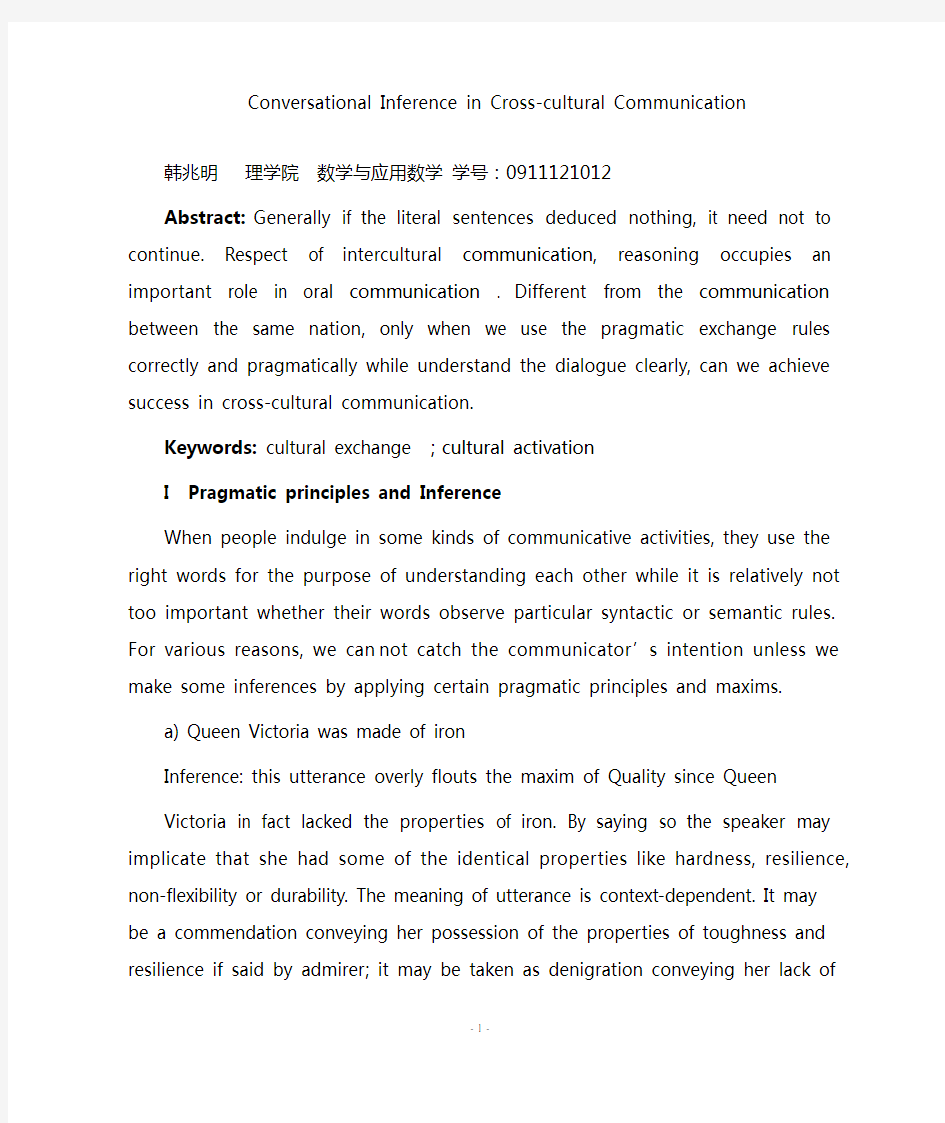大学英文文献及翻译

- 1、下载文档前请自行甄别文档内容的完整性,平台不提供额外的编辑、内容补充、找答案等附加服务。
- 2、"仅部分预览"的文档,不可在线预览部分如存在完整性等问题,可反馈申请退款(可完整预览的文档不适用该条件!)。
- 3、如文档侵犯您的权益,请联系客服反馈,我们会尽快为您处理(人工客服工作时间:9:00-18:30)。
Conversational Inference in Cross-cultural Communication
韩兆明理学院数学与应用数学学号:0911121012
Abstract: Generally if the literal sentences deduced nothing, it need not to continue. Respect of intercultural communication, reasoning occupies an important role in oral communication . Different from the communication between the same nation, only when we use the pragmatic exchange rules correctly and pragmatically while understand the dialogue clearly, can we achieve success in cross-cultural communication.
Keywords: cultural exchange ;cultural activation
I Pragmatic principles and Inference
When people indulge in some kinds of communicative activities, they use the right words for the purpose of understanding each other while it is relatively not too important whether their words observe particular syntactic or semantic rules. For various reasons, we can not catch the communicator’s intention unless we make some inferences by applying certain pragmatic principles and maxims.
a) Queen Victoria was made of iron
Inference: this utterance overly flouts the maxim of Quality since Queen
Victoria in fact lacked the properties of iron. By saying so the speaker may implicate that she had some of the identical properties like hardness, resilience, non-flexibility or durability. The meaning of utterance is context-dependent. It may be a commendation conveying her possession of the properties of toughness and resilience if said by admirer; it may be taken as denigration conveying her lack of flexity, emotional impassivity or belligerence, if said by a detractor.
b)War is war
Inference: this utterance is a tautology, seen from a semanic point of view, and bears no communicative value, at least in principle. When it is uttered for communicative purpose in a certain context, it has communicative significance. It overtly flouts the maximum of Quantity, which requires that speakers be informative. So, if the assumption that the speakers are actually preserving cooperating, some informative inference must be made. The utterance might implicate “err a ble thing always happen in war”,“that’s its nature and it’s no good lamenting
that particular disaster.”
c) A: What do you intend to do today
B: I have a terrible headache.
Inference: B’s answer breaches the maxim of ralevanc e as it is not, at least superficially, related to A’s question.If we assume that B’s still cooperating,we have to do some further inferring. By saying so B is forcing A to infer the implicature “B is not going to do anyt hing today”.
d) A: Let’s get the kids something.
B: OK, but veto I-C-E-C-R-E-A-M-S.
Inference: B deliberately infringes the maxim of manner (be perspicuous)by spelling out the word “ice-cream”.By saying so, B is trying to force A to infer the real meaning B’s utterance may implicate that B would rather not have ice cream mentioned in the presence of the children in case they are thereby prompted to demand some improvement.
II Context and Inference
According to Malinowski, context plays an important role in understanding the speaker’s intention.“Exactly as in the reality of spoken or written languages,a word without linguistic context is a mere figment and stands for noting by itself, so in the reality of a spoken living tongue, the utterance has no meaning except in the context of situa tion.” (1923) Undoubtedly, both communication within a culture and cross-cultural one must comply with Cp. But cross-cultural communication figures more on context.
a) Verbal Context
According to He Zhaoxiong(1989), context includes language knowledge and non-language knowledge, which is similar as the classification of it in this paper.
b) Non-verbal Context
Non-verbal Context is involved in concrete situation and cultural knowledge (Malinowski, 1923). It is characterized by generality and inseparable part leading to successful communication. In communication, the concerned non-verbal context is prerequisite condition for making correct inferences, which result in successful exchange ultimately.
